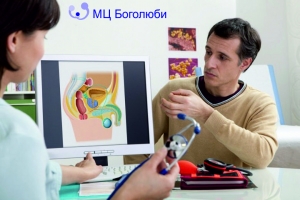The first place among inflammatory diseases of the male genital area today is confidently held by prostatitis. About 40% of visits to the urologist-andrologist are caused by this disease. Against the background of such disappointing statistics , it should be taken into account that the causes, mechanisms of development and principles of treatment of prostatitis in the urological community are still controversial and controversial.
Modern studies open up the problem of prostatitis in a new perspective, but outdated, deeply rooted views are still prevalent both among patients and among the workers. Let's get acquainted with the most common of them.
Only older men suffer from prostatitis. No. "Favorite" age of prostatitis - from 20 to 40 years. Men over 60 are more likely to develop prostate adenoma, which is accompanied by prostatitis.
Abstinence leads to prostatitis. No. Due to the lack of sex, prostatitis does not occur. The male body is capable of self-regulation of sexual function. On the contrary, promiscuous active sexual intercourse carries the risk of sexually transmitted diseases, and with them - and prostatitis.
Prostatitis is only sexually transmitted. Not always. Sexually transmitted infections are one of a number of causes of prostatitis. The prostate gland can become inflamed without their participation. Often, the causative agent of the disease is Escherichia coli or streptococci - the patient's own bacterial flora.
Frequent urge to urinate and pain above the pubis are signs of prostatitis. Not always. In 50% of cases of chronic prostatitis, the patient does not present any complaints. The man may not be bothered at all, while the partner has a regular exacerbation of chronic cystitis or candidiasis.
If the smears for STIs are negative, then the cause of prostatitis is not a genital infection. Not always. After the courses of treatment in smears from the urethra, it is very rare to detect the pathogen. This is due to the fact that in the case of a running process, pathogenic agents migrate from the urethra to the prostate, and their quantitative indicators are very insignificant. To identify the pathogen, a study of the secretion of the prostate gland by the culture method is required .
Prostatitis is not contagious, only the patient himself should be treated . No. The causative agent of inflammation can be sexually transmitted pathogens, therefore, all sexual partners of the patient should also undergo therapy.
Very often there is a situation in which women , they eyuschih sex with male patients , diagnosed with inflammatory diseases of the genitourinary system . Their treatment has a short-term effect , if not associated with examinations and parallel therapy of the partner.
Prostatitis can only be treated with antibiotics. Not always. The method of treatment depends on the nature of the causative agent of inflammation. So with viral and protozoal prostatitis, antibiotic therapy will not help, and may worsen the course of the disease.
Prostatitis leads to prostate adenoma. No. Although these diseases and have similar symptoms associated with urinary disorders. However, inflammation of the prostate is not a risk factor for adenoma . Its development is caused by a violation of the patient's hormonal levels. With adenoma, there is no pain syndrome and disorders of sexual function.
Prostatitis can go away without treatment. E is the most dangerous myth, because the absence of adequate therapy is fraught with serious complications. Self-healing does not occur, and a decrease in the intensity of the symptoms of the disease signals that prostatitis has become chronic.
Prostatitis is incurable. Such a false impression may develop in a patient with frequently recurrent, chronic prostatitis. For the treatment to be successful, it is necessary to establish a reliable cause with the help of laboratory tests. Then apply an individual complex treatment using systemic and local drugs, physiotherapy procedures, rectal massage.
Urologists of MC " Bogolyuby " emphasize that modern medicine has a sufficient arsenal of knowledge and means to cure both acute and chronic prostatitis. If you have questions or doubts about your male health, you should not postpone them and be ashamed , contact our specialists for help .

















